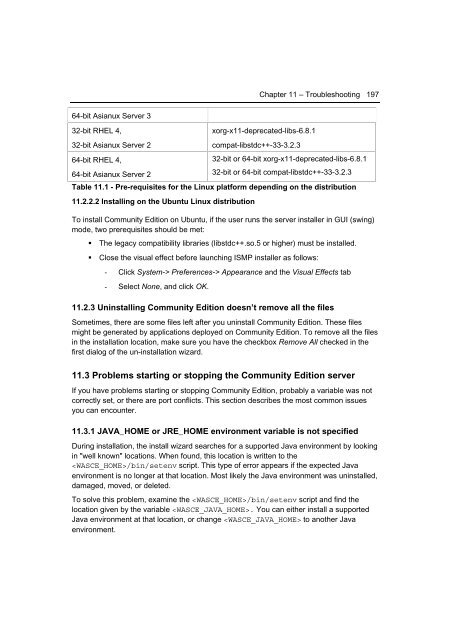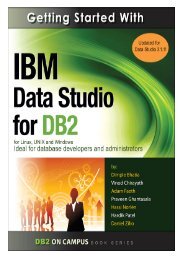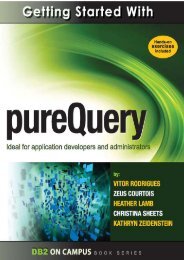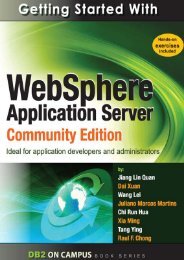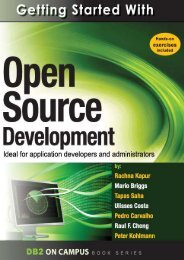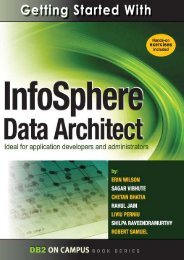Getting Started with WebSphere Application Server
You also want an ePaper? Increase the reach of your titles
YUMPU automatically turns print PDFs into web optimized ePapers that Google loves.
Chapter 11 – Troubleshooting 197<br />
64-bit Asianux <strong>Server</strong> 3<br />
32-bit RHEL 4,<br />
32-bit Asianux <strong>Server</strong> 2<br />
64-bit RHEL 4,<br />
64-bit Asianux <strong>Server</strong> 2<br />
xorg-x11-deprecated-libs-6.8.1<br />
compat-libstdc++-33-3.2.3<br />
32-bit or 64-bit xorg-x11-deprecated-libs-6.8.1<br />
32-bit or 64-bit compat-libstdc++-33-3.2.3<br />
Table 11.1 - Pre-requisites for the Linux platform depending on the distribution<br />
11.2.2.2 Installing on the Ubuntu Linux distribution<br />
To install Community Edition on Ubuntu, if the user runs the server installer in GUI (swing)<br />
mode, two prerequisites should be met:<br />
• The legacy compatibility libraries (libstdc++.so.5 or higher) must be installed.<br />
• Close the visual effect before launching ISMP installer as follows:<br />
- Click System-> Preferences-> Appearance and the Visual Effects tab<br />
- Select None, and click OK.<br />
11.2.3 Uninstalling Community Edition doesn’t remove all the files<br />
Sometimes, there are some files left after you uninstall Community Edition. These files<br />
might be generated by applications deployed on Community Edition. To remove all the files<br />
in the installation location, make sure you have the checkbox Remove All checked in the<br />
first dialog of the un-installation wizard.<br />
11.3 Problems starting or stopping the Community Edition server<br />
If you have problems starting or stopping Community Edition, probably a variable was not<br />
correctly set, or there are port conflicts. This section describes the most common issues<br />
you can encounter.<br />
11.3.1 JAVA_HOME or JRE_HOME environment variable is not specified<br />
During installation, the install wizard searches for a supported Java environment by looking<br />
in "well known" locations. When found, this location is written to the<br />
/bin/setenv script. This type of error appears if the expected Java<br />
environment is no longer at that location. Most likely the Java environment was uninstalled,<br />
damaged, moved, or deleted.<br />
To solve this problem, examine the /bin/setenv script and find the<br />
location given by the variable . You can either install a supported<br />
Java environment at that location, or change to another Java<br />
environment.


